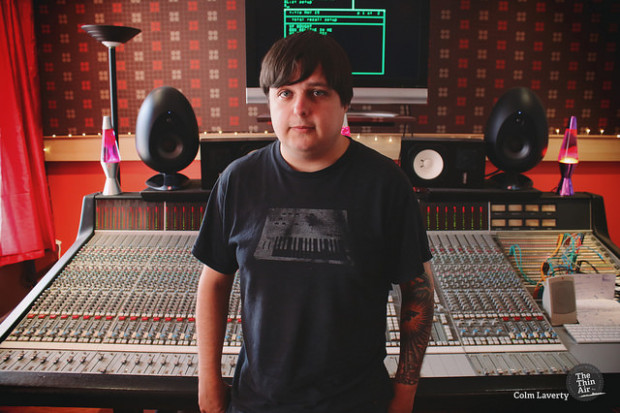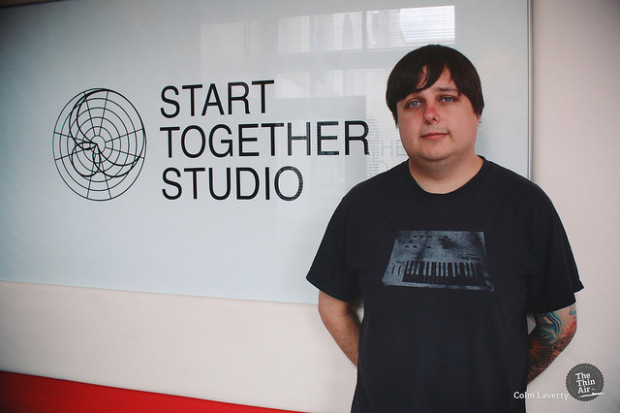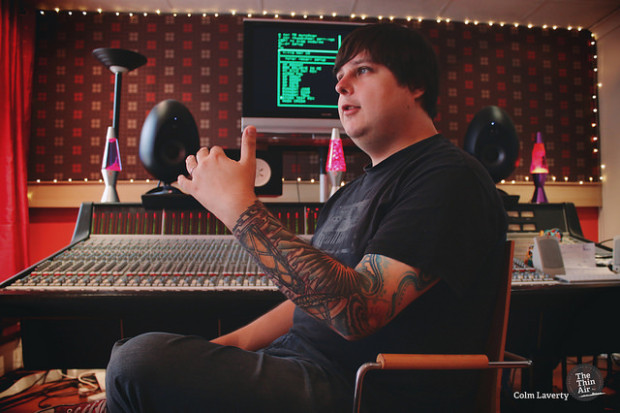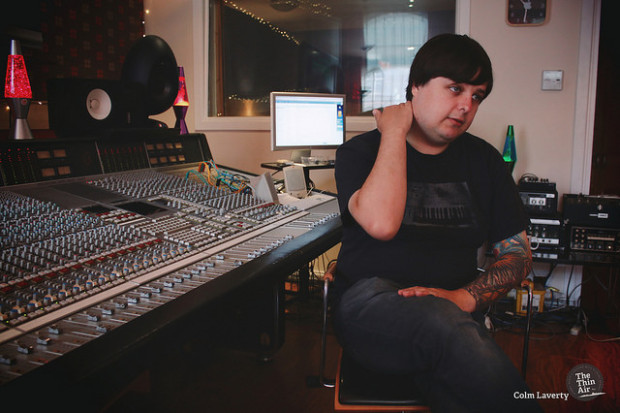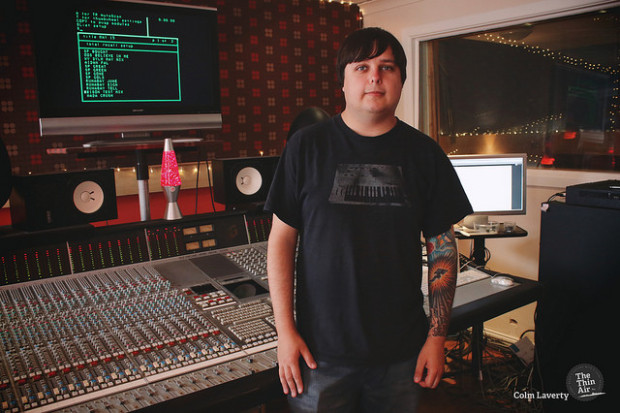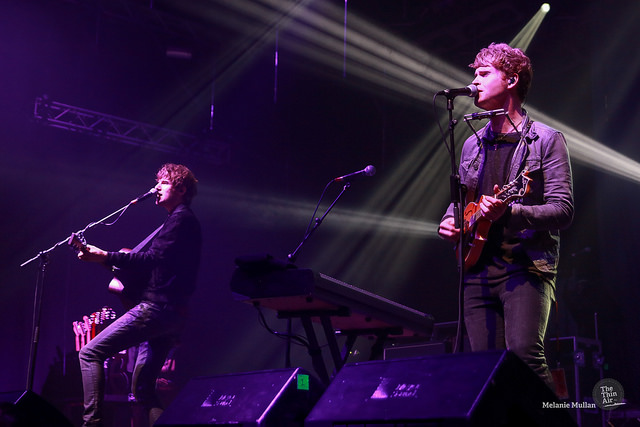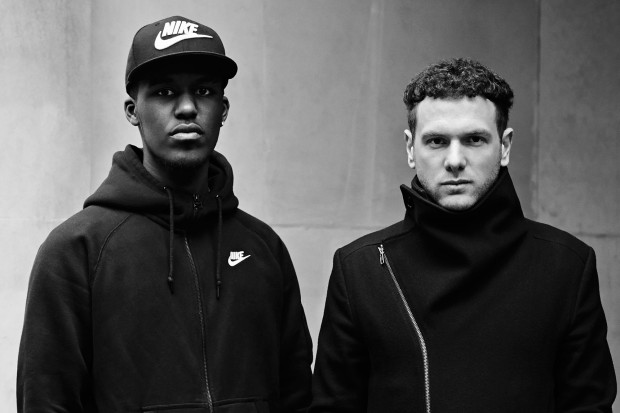In the latest installment of Front of House, Laura Carland chats to Rocky O’Reilly of Start Together Studios about the origins of the studio, making music as part of Malibu Shark Attack, his career highlights to date and much more. Photos by Colm Laverty.
Hi Rocky! Can you tell us a little bit about yourself?
Hi, my name is Rocky O’Reilly and I’m a recording engineer , producer and mixer. I co-own Start Together Studios in Belfast where I spend most of my time recording all sorts of music from doom metal through to indie-pop and rap music.
How did you first become involved in music?
I guess it was my music teacher, Donal McCrisken, who got me into music because he told me that even though I wasn’t classically trained, I could still work in music as a career. I left school after my GCSEs but by then I was already involved in music by recording bands at my school and mixing sound for concerts. I also started shadowing a promoter when I was sixteen. From there I had this long and winding path which started at a Def Leppard concert watching a guy in the crew set up the stage through to where I am today. I toured with bands mixing sound, I played in band and I worked in a post-production studio writing music for television. When I was 18 or 19 I toured doing sound with a rap band from California called Ugly Duckling around Europe. They taught me so much about how to be a person, how to live on a bus with people, how to tour and why they liked music. That really stuck with me. Their DJ, Einstein, let me stay in his house in LA when I was thinking about moving there at about age 21 and he let me stay for weeks on end. I also hung out there in studios where a few albums I loved were recorded and I went there to chat to people and ask questions. Eventually after touring with my own band for five years, I started recording other bands in everywhere from their mums houses to the middle of the countryside and then eventually I started a studio.
How did Start Together Studios come about?
For us it was quite natural. I was in a band [Oppenheimer] and we needed a space to record our album. At that time, in Belfast, there weren’t really any studios that would let other producers come in and hire the facility particularly since we needed a space for about eight weeks. Through necessity, we just bought a computer and starting with about eight microphones and maybe two pre-amplifiers, we put together a small set up. We met with a couple of other engineers who were in a similar situation, working everywhere from mills in West Belfast or recording from home for example and we just decided to hold our equipment together and built it from there. It basically grew organically from that point. If we recorded an album for a band with an amazing vocalist, we would buy a really good vocal microphone or if we recorded an instrumental album, we’d buy five guitar amps. It started with one boxful of equipment and now it’s more than three studios. We’re actually running out of room at this point.
Who came up with the name ‘Start Together’?
That was my idea. It’s named after a song by Sleater Kinney, who are one of my favourite bands. When I left school, I did a foundation year at Bangor College and every single day that I went there, on my Walkman, I had ‘The Hot Rock’ on and the first song on that album was called ‘Start Together’. My memories of getting into music, going to gigs at night time in Belfast basically come back to that particular song. Title wise it locked in a little with what we were trying to do as new engineers. Sleater Kinney, after having got back together after 10 years, released a boxset of all their albums last year and they called it ‘Start Together’. It was too good to be true. It cost about $300 dollars to get one to Belfast. They released a limited edition, seven album set and each album was coloured to match in with the art work. With the price of it and postage and customs it was working out pretty expensive but I had to have it. There aren’t many bands, historically, that could release anything that would make me do that but having grown up with the band – they were one of the first bands I got into – they are one of the bands that have stuck with me. I saw them play this year in Dublin and it was one of the best gigs I’ve seen. It was incredible. I’ve only ever seen them once before that because one of my old bands supported them in Belfast but the sound was really bad and I was absolutely gutted. I don’t think I’m ever going to see them again because Dublin was perfect.
Can you describe your typical working day?
I think I have about three or four types of typical working day. The most common one involves meeting a band at the studio. I’ll normally arrive about an hour ahead of them about 9am or 9.30am and when they join me about 10am or 10.30am, we’ll work until we’re really happy with everything. It can take about 10 to 14 hours – it depends on how much we all get done. What happens within that day is usually pretty different each time. It can be part of a three week process or a two day single recording. Another type of day involves me sitting and mixing and this can be done on my own or if the band live in Ireland, they can join me. It can be quite solitary at times, which I like, because it gives me time to focus. Sometimes when you’re replaying tracks a lot you can sometimes need no one else to be around particularly since there’s a tendency to sit and chat about music instead of actually working on stuff. Once a month, there’s the horrible day whereby I have to do the accounts and try to run a business and quite often some days – once a month or every five weeks – involve me having to travel a lot to festivals or to meet people in different cities in the UK and Ireland. It’s cool though because those different types of activities keep things interesting so you never really feel like you’re doing the same thing twice.
How do you choose which artists to work with?
It’s about 50/50 at this point in terms of artists and bands approaching me and me approaching them. I make a really big effort to go and see bands and artists and pitch to them, tell them what I would like to do and ask them if they want to work with me. Usually, hopefully, they do want to work with me and that’s usually based on past experience or I because I can give them examples of music I’ve worked on before. For the people who have heard the stuff that I’ve recorded but I don’t know them or I haven’t worked with them before, we usually just meet up and chat. I was actually answering emails at 1am last night from people who wanted to meet like that. I’m really open to working with anyone if I think I can bring something to the music. I have to go through a process of making sure that I can actually do something cool otherwise there’s no point in working together if there is nothing creatively I can bring to it. If it’s something that’s way outside something that I’m into – I’m not even sure what style of music to say – and I don’t think I’d actually be good at recording it then I’d be quite open about that. Maybe something like harder, more extreme rap music which has very little musicality to it but I’ve worked with that kind of music before out in Morocco for the Pop Up Studio Project for the British Council.
For me, so long as the person that’s making the music really believes in it and they are doing it for the right reasons in terms of not doing it for lots of money or second guessing what’s current or in trend – if those elements are in place and I really like the music then I’ll do it. Everything else in terms of money and set up and how difficult it might be is just part of the process. I think that’s why I’ve ended up doing such diverse projects at varying extremes like the indie pop music I’ve made in the past to the heavier bands I’ve recorded. For me the heavy metal band are exactly the same as the indie pop bands. They may be coming from a different musical direction but the reason they are doing it is usually the same.
There’s a little bit of a perception about Start Together that we don’t want to record music. I get emails from bands asking if they are allowed to record at our studios but of course they are. We want them to record at our studios and will do everything we possibly can to make that happen. We’re trying to establish that Start Together is not some sort of secret club with a special knock to get in. We want to help, we want to get bands and artists in to record and get producers to use our studio. We’ve been working on that and for example you have people like Ryan McGroarty from Wonder Villains who has been producing and mixing in here or Chris Ryan from Robocobra Quartet who has been making some incredible recordings. We want people to use us. At the moment we have Shauna from Silhouette who has a new project and I’ve been working with Pete McCauley from RAMs Pocket Radio who is releasing a few singles and I’ve recently done some stuff with The Clameens. I’ve probably done more NI stuff in the last few months than I have in the last few years. We have all our drum kits, guitar amps and mics and rooms. We want it to be used.
You mentioned working in Morocco for the Pop Up Studio Programme for the British Council. Can you tell us more about the project?
It was all thanks to a guy called Jimmy Devlin who runs No Dancing Records. He got Start Together Studios involved and the project ran along in conjunction with the British Council. The idea was to improve the sustainable development of the music scene in Marrakech. Jimmy had been doing some workshops out in Morocco with the Wonder Villains and when they were speaking to young people and young artists, every idea or method they said to them was met with ‘We can’t do that’, ‘We can’t do this’, ‘We can’t play gigs, make recordings, make t-shirts’ etc. Jimmy came to me and suggested that we went out with a cheap recording set up and show people that they actually could do this.
We went out the first year and brought And So I Watch You From Afar and it worked really well. We recorded about 19 songs in a week working 19 hours a day. Bands were hearing we were in town and running up to us to record. The next year, Rory Friers (ASIWYFA) and I went back out because they wanted to focus on song writing and production. We did another 12-15 songs and we went around regionally to these tiny towns in Morocco. You got the feeling that no one from Ireland had been there before. There would be primary schools of kids running after us probably thinking ‘Look at these weirdos’. We also brought Ryan McGroarty from Wonder Villains out to deliver production workshops to teach people to use compressors and the like whilst Rory and I worked like mad. People were coming up asking to record as much as three songs and Rory would be too nice to say no. We took over three rooms in this college and it was all hands on deck. It was amazing because of all their enthusiasm and yet after hearing about their limited opportunities, when they saw they had a chance to create, it was intense. It doesn’t seem fair to single people out but there is an artist called Nada Azari. I don’t know how to help her more but the whole concept of what the British Council are trying to do is to develop everything and find routes internationally. She recorded two songs in an afternoon with just guitar and vocals. One take in a hotel reception with a cheap microphone into a broken interface start to finish. It’s not like when we record here because it would be rare to do a session with a new band in Ireland and not have conversation drift towards talking about getting management deals or getting played on the radio. In Morocco, they just wanted to make the music. It’s very pure and simplistic but not naïve in any way. They don’t have pro tools to fix what they record so they perfect everything as much as they can live. Nada’s voice is really cool and yet she felt like she couldn’t write but the two songs she wrote were amazing pop tunes.
Those recordings are now out there all over the world in any little town or village which is cool. I think that’s my favourite thing about making music. Hopefully we can keep working on the programme. In a similar way, I did a little bit of work in East Belfast. It’s about bringing music to people where music can change their life but they aren’t quite sure how to make it happen. It’s trying to give people a few lifts up with that.
What are the biggest problems – if any – you encounter in your line of work and what would you say is the biggest success?
For me, the biggest success is buying our mixing desk which was a huge risk at the time. It’s an old SSL. So many albums have been made on these. It cost a bomb, it was a nightmare to get it and get it working and to do that we were doing we had to expand to a second and third space. It was a huge risk but we survived it.
Having to run a business is not really a problem but it’s probably the only downside. Well, that mixed with not having enough time. Behind the scenes there is so much work to be done in terms of accounting, cash flows, chasing payments – all that crap that has nothing to do with music. It’s not really a downside either though because it’s a necessity. I complain about it a lot but it’s important. We need it to ensure the freedom we have. If we want to record a band and they don’t have budget we can still work on it whereas if I didn’t have the studio, we couldn’t do it. If we could record for free, we would do it. Having to monetise what we do is the most difficult part but we’re lucky that most of our clients make money from their music. If it was really easy everyone would be doing it but it all balances out.
Are there any artists you’d particularly like to work with that you haven’t had the chance to yet?
There are loads of bands I’d love to work with and I think there’s more bands this year more than any year before that I’ve seen that I’ve been so excited by. There has been a couple that I’ve wanted to work with but it just didn’t work out because they already had plans place or they live too far away. One of my favourite bands in the last ten years or more are The Bronx and I’d absolutely love to do something with them but they don’t need it. Their guitarist is an amazing producer. The recordings he makes are so exciting so I’d love to work with him. What he does and the energy he captures is incredible. I think they are a band that has everything going about them in terms of the live show and their albums etc. Every day they do whatever the hell they want which is amazing. Every time I’ve ever seen them it’s been the best gig ever. It just sweeps over you – it’s impossible to not get involved. It’s brilliant. The last band I was in actually had their singer guest on a track. They are a great influence and band that continue to excite me.
Do you find that being a producer, with the ability to dissect songs, impacts on your personal experience of listening to music for pleasure? Can you switch off?
I’ve got a really good switch. For me when I hear it on the radio for the first time, it’s done, it’s out and that even applies to tracks I’ve worked on. Switching off is easy. When we’re in the studio, everything is up for grabs, I can push faders etc. but when I get into my car and I’m playing it on the stereo, it’s just a piece of music. I can then judge it more as a listener then rather than a producer. For live music, if I’m really into it, it doesn’t matter. The only thing it has done that’s potentially slightly negative is I’ll maybe not spend as long with certain tracks if there’s something about it that I don’t quite like about it – I won’t spend as long trying to push through that but I guess that just makes me a normal indie snob.
Do you have a favourite piece of music or a favourite album that you’ve worked on?
Definitely working on ‘Gangs’ by And So I Watch You From Afar was a cool and interesting experience. The impact that that had afterwards was really quite unexpected because we were just in the process and I had no expectations of what it was going to be. It seems to be an album that has connected with a lot of people and even since then just last week I was chatting to someone who told me, ‘That album means so much to me’. I was in the South of France a few weeks ago and spotted related tattoos – that connection with people has made it one of my favourite things. That was the second album I made with the guys and we’ve done two more since. I love working with them. Their ideas and their intensity and enthusiasm is really cool. I also loved the second General Fiasco album that we made. There were a couple of tracks on that album that were unbelievable and for whatever reason it just didn’t happen which is disappointing but I still go back to songs on that album and I’m so happy with them. I’m afraid of missing something out! I’ll probably pick a weird one here but the first Pocket Billiards album too. They had been around performing for a long, long time before getting around to recording so to actually finally capture the songs was really cool. We made the whole album in three days – a pretty quick process – and it’s full of the energy they bring to their performances. It was quite early on for us in the studio too so looking back, technically and sonically, I feel like I could do ten times the job but in terms of capturing a band at a point – that was a really cool one.
The Wonder Villains named their debut album, Rocky, after you. Is it flattering or a little bit strange having an album named after you?
It’s so strange! Seeing all the press releases and reviews at the time, it was a bit embarrassing for a while but I got used to it. The first time I heard the Wonder Villains was such a highlight for me. You just have these super young people in their bedroom making music and they don’t care about anything else outside that bubble. They are doing this because they think it’s cool and are so excited about it. They are great.
You’re not just a producer – you’re a musician having played in the likes of Torgas Valley Reds, Oppenheimer and Malibu Shark Attack. Have you any plans to release any more music of your own? Would you ever consider getting Oppenheimer back together?
Torgas Valley Reds and probably the Wonder Villains are one of my two favourite ever Northern Irish bands. Torgas Valley Reds asked me to come and play keyboards towards the end of the band. They had such great tunes. It’s also so strange that people still talk about Oppenheimer but there’s no chance of a reunion there. There were some offers a few years ago for festivals but it’s just not going to happen. Shaun has always been dead set against when bands get back together when it’s clear the only reason they are doing it is because of money offers. It’s also just not where either of us are at. I wouldn’t see the point to get back together to play songs that are in the past. I love those songs though and the albums and the experience of it. I was only 21/22 when it started – my first proper band – so for me to record three songs, put them on demos, put them in the post, get a record deal, get a publishing deal and go on tour; it was all too good to be true. Our attitude has always been to, to quote The Simpsons, ‘We must move forward, not backward’. There’s no sense in going back. It might almost spoil it … plus I would have to learn the songs again and I don’t think I’d have the time.
There’s a new Malibu Shark Attack album in progress that I’m writing right now. We’re swapping files back and forth at the minute and we have about 11 songs. I’ve another little project that I’m working on with two other people, one of whom is Rory Friers from ASIWYFA and we’re going to be finishing that over the Summer. Whenever we have a spare day off we get together and make noises. We’ve travelled a fair bit together in recent years out to Morocco so when there’s downtime there, we play around with synths and guitars. So we have an album in that if we get it together. I have loads of other ideas for stuff but it’s finding the time which is quite difficult. I think if I wasn’t so busy making other albums I would probably start another band full time.
The thing I didn’t enjoy about being in a band is that you only got to make one album every two years. You made an album, then toured it then made the next one and had to wait even longer. I found that a bit frustrating but at least this way I can make about 10 albums a year with lots of different types of music which makes me feel more inspired and creative moving from distorted guitars to twinkly synthesisers within the space of two weeks. I feel like I couldn’t do that if I was in a band.
Do you have a preference for performing or producing?
It’s a tough one because I feel like I’ve done enough performing. I was really lucky with Oppenheimer that we got to tour as much as we did and play in the venues we did. I’ve done that and really loved it. It would be impossible to say no to it. I enjoy playing. I did a Malibu Shark Attack tour in England which was really fun. We had a couple of other people in the band with us and they were really nervous, as was I, but as soon as the show started I stopped being nervous and it all came back to me. I don’t know how many gigs I’ve played – maybe hundreds or maybe more than a thousand. It takes so much to be in a band and to really commit to it so it has to be everything, every single day being in the band and I just couldn’t do it in a half assed sort of way. I’m so focused that when I start something I want to do it as best I can. With Malibu Shark Attack, Tribe One is going to tour that – he can play without me – and I can write songs as an outlet for creativity. I definitely prefer producing but performing is amazing because of the instant connection and instant feedback. If it’s bad you can see it and if it’s good you can see it whereby in the studio you can work on something for six months and six months or 12 months later when it comes out that’s when you get the feedback. The only downside is sometimes you’re releasing music maybe 18 months after you’ve recorded it and people are making judgements on something you’ve already moved on from. A recording can be a better reflection of where you are creatively.
Malibu Shark Attack is a cross-Atlantic project – how does it work?
It’s a slow process swapping files across until we set ourselves and deadline and then it’s flat out. The first album took a while but that was in a transition period for me when Oppenheimer stopped. I had worked with one person for about six years and had to learn to work with other people again. I went through a few different options before I came to work with Tribe One. One of the coolest things about that time is that we had one Skype conversation before we met which lasted about 10 minutes and everything else was just through emails. When we talked on Skype, we had actually already finished the album. We eventually met at a train station in Leicester and walked around the corner straight into sound check for the gigs. It was the opposite of everything I’d ever been used to. The reason it works is because I heard songs of his and lyrically I thought he was cool and there’s a lot of trust in the other person that they are putting it the work. He quit his job two years ago to do this full time so I know he’s there for it. Working at a distance means communication is so important and with time differences it can be difficult so we try to avoid it as much as possible. I feel like he’s an old friend at this point. We got to hang out after the tour and he came to stay with us for a while which meant we got to show him about Northern Ireland which was great.
Would you have any advice for anyone who would like to break into the music industry?
I think you really need to want to do it, have an idea of what it is that you can do that no one else can and then work really hard at doing that thing. Take advice and learn from people. Ask really good questions to the right people, be really friendly and don’t send really long rambling emails at odd times of the night. I used to do it and it’s a mistake. From time to time, we get emails with maybe 50 to 60 people addressed in the ‘To’ box with ‘Hey, check us out’ without saying anything about what they want to do or what they think they need to do. It switches people off. We respond but usually tell them not to send emails like this because I’ve been in their position just starting out and know what it’s like. People in the music industry are so busy and work so hard you need to catch them right and at the right time. It’s kind of luck but if you present yourself in the friendliest but most direct way you’re in with a better chance. That’s probably terrible advice!
Have you any career highlights so far?
So many to be honest! It’s amazing that people keep bringing up Oppenheimer for a start. Strangely as a performer, one time that sticks out was when I joined Torgas Valley Reds, they supported Bryan Adams in The Odyssey Arena. It was a last minute thing. We tried to support Jimmy Eat World in the Ulster Hall and from memory, I think Element (who became In Case Of Fire) got it and then they offered us the Bryan Adams support slot instead. On the day of the show, we were told it wasn’t going to happen because we needed so much equipment but we were a bit like ‘Is it fuck – it’s going to happen. We’re playing!’. That’s the only time I’ve played in an ice hockey stadium and I clearly remember when the lights when down and the noise of the people. I think I had only been in the band for about three months at this point and I was into first ten gigs ever or so, so that was terrifying but I sort of survived.
All these other little points stand out like Oppenheimer music being played on TV shows, which was amazing or being on The Craig Ferguson Show which was a surreal experience. Everything Oppenheimer did was a highlight with the exception of one interview piece which was a car crash that’s still on the Internet. I’m not giving you the link but it lasts an hour and it’s awful.
Touring with They Might Be Giants was one of the best things that ever happened to me because I got to watch them be amazing musicians all the time. I’d fly to America tomorrow to see them. They took us under their wing and taught us so much from t-shirt sales to song writing and even just how to be people.
In all honesty, everything has been a highlight but being here in 2015 doing what we do is the best highlight of all. At a time when you hear about sales in decline and everything is going to shit, we’re making music all the time and we’re meeting so many people from Northern Ireland and the rest of the world doing the same thing. It’s still all there and it’s still really exciting. I suppose you could say the real highlight is the fact we’re getting away with it.

